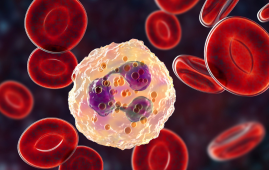

Researchers from China’s Department of Child Rehabilitation discovered substantial variations in the gut microbiome of children who went to bed early vs those who stayed up late. The study found that children with earlier bedtimes have more microbial diversity in their gut flora. Beneficial bacteria, such as Akkermansia muciniphila, were more prevalent in the early sleepers. These microorganisms are associated with gut health and cognitive function.
Previous research has indicated that proper sleep enhances academic achievement, physical growth, and is linked to lower BMI levels. The current study looked at the association between children’s sleep patterns and their gut microbiome. In an article titled “Characteristics of gut flora in children who go to bed early versus late,” published in Scientific Reports, researchers examined the genomes of fecal samples from 88 healthy children aged 2 to 14.
The children were divided into two groups based on their bedtimes: those who slept before 9:30 p.m. and those who slept later. Over a two-week period, sleep diaries documented parameters such as time to fall asleep, nocturnal awakenings, sleep efficiency, and quality.
A genomic research revealed that children who went to bed earlier had a higher abundance of particular beneficial gut flora. Akkermansia muciniphila was most abundant in the early bedtime group.
Other bacteria found in early sleepers included Holdemania filiformis, Firmicutes bacterium CAG-95, Streptococcus sp. A12, Weissella confusa, Clostridium sp. CAG-253, Alistipes finegoldii, and Eubacterium siraeum. Furthermore, levels of CAG-83 fungus were higher in the early bedtime group.
Verrucomicrobia, Akkermansia, Holdemania, and unidentified Firmicutes were more abundant in the early sleep group.
Correlation research of sleep metrics and microbial species found that Akkermansia muciniphila and Alistipes finegoldii were positively connected with time to fall asleep. Clostridium sp. CAG-253 was found to have a negative correlation with sleep onset latency.
Alistipes finegoldii was associated with increased total sleep duration but decreased dream frequency and sleep efficiency. Alistipes finegoldii, Akkermansia muciniphila, and Holdemania filiformis all shown negative relationships with sleep quality.
Metabolic study revealed that early sleepers had greater activity in amino acid metabolism and neurotransmitter modulation. These pathways are critical for brain function and development, implying a probable link between gut health and cognition.
“These differences in species diversity and metabolic pathways suggest that sleep patterns significantly influence gut microbiota,” the research paper states. “Our findings may lead to new pharmacological interventions targeting sleep disorders in children.”
Correlation without causation
The discovery could represent a correlation between sleep patterns and microbiome outcomes, or the contrary, where the microbiota drives sleep patterns. While the study concentrated on the first scenario, the children’s sleep routines were their own regular, habitual bedtimes, with no interference from the researchers.
These associations have significant promise for further investigation to uncover the causal mechanisms underlying the sleep-gut-cognitive relationship.
For more information: Chunmei Mao et al, Characteristics of gut flora in children who go to bed early versus late, Scientific Reports (2024), https://dx.doi.org/10.1038/s41598-024-75006-y
more recommended stories
 Silica Nanomatrix Boosts Dendritic Cell Cancer Therapy
Silica Nanomatrix Boosts Dendritic Cell Cancer TherapyKey Points Summary Researchers developed a.
 Vagus Nerve and Cardiac Aging: New Heart Study
Vagus Nerve and Cardiac Aging: New Heart StudyKey Takeaways for Healthcare Professionals Preserving.
 Cognitive Distraction From Conversation While Driving
Cognitive Distraction From Conversation While DrivingKey Takeaways (Quick Summary) Talking, not.
 Fat-Regulating Enzyme Offers New Target for Obesity
Fat-Regulating Enzyme Offers New Target for ObesityKey Highlights (Quick Summary) Researchers identified.
 Spatial Computing Explains How Brain Organizes Cognition
Spatial Computing Explains How Brain Organizes CognitionKey Takeaways (Quick Summary) MIT researchers.
 Gestational Diabetes Risk Identified by Blood Metabolites
Gestational Diabetes Risk Identified by Blood MetabolitesKey Takeaways (Quick Summary for Clinicians).
 Phage Therapy Study Reveals RNA-Based Infection Control
Phage Therapy Study Reveals RNA-Based Infection ControlKey Takeaways (Quick Summary) Researchers uncovered.
 Pelvic Floor Disorders: Treatable Yet Often Ignored
Pelvic Floor Disorders: Treatable Yet Often IgnoredKey Takeaways (Quick Summary) Pelvic floor.
 Urine-Based microRNA Aging Clock Predicts Biological Age
Urine-Based microRNA Aging Clock Predicts Biological AgeKey Takeaways (Quick Summary) Researchers developed.
 Circadian Control of Neutrophils in Myocardial Infarction
Circadian Control of Neutrophils in Myocardial InfarctionKey Takeaways for HCPs Neutrophil activity.

Leave a Comment